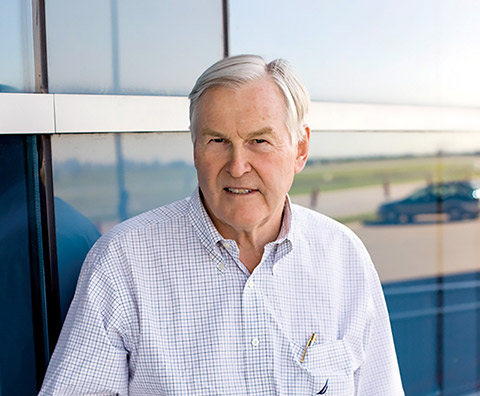On the 49th floor of a downtown Toronto bank tower, U of T chancellor Michael Wilson marvels at how open students are becoming about mental health. When he was a Trinity student in the 1950s, that type of courage was in short supply. “Back then,” he says, “we certainly talked about nervous breakdowns, but we didn’t have any real understanding of what mental illness was.”
Last year, the Globe and Mail’s Andre Picard called Wilson “as unlikely a hero as one could imagine for the mental health movement.” The former federal finance minister and ambassador to the United States has long occupied the top echelons of public and private service – worlds where civility, order and steely rectitude rule the day. And where, until recently, talk of mental illness had no place.
But in the suburban homes of Etobicoke, where Wilson once served as a member of Parliament, people were not at all shy to talk about it. “They’d tell me about serious problems they were having with family members,” he recalls. “Some of their stories were quite tragic.” Those stories stayed with him. As his political career drew to a close in 1993, he underwent a sort of epiphany on a Jamaican beach, while reading an article about mental illness. He’d long been a volunteer for the Canadian Cancer Society, but it occurred to him that he didn’t know anyone who volunteered to improve mental health.
Wilson’s newfound public concern, however, would soon be brought painfully close to home. Early in the 1990s, his 29-year-old son Cameron became severely ill with depression. In 1995, he took his own life.
From the moment of Cameron’s eulogy, Wilson made a point of being upfront about his son’s depression. The choice to do so wasn’t difficult. “I saw the impact of what stigma had done to him,” Wilson says, “how he didn’t want his friends to know about his illness. I believed that contributed to his death. So rather than hide it, I said I owe it to other people to not let them suffer the way Cameron did.”
Since then, Wilson’s advocacy efforts have been ceaseless. Most recently, he was appointed the Mental Health Commission of Canada’s board chair. At U of T, he helped to establish the Cameron Parker Holcombe Wilson Chair in Depression Studies, which (among other things) is currently improving our understanding of the disease’s genetic underpinnings.
In the 20 years since Cameron Wilson’s death, depression has not been cured. And yet, so much has changed for the better since then. “Earlier this year,” says his father, “I had a meeting with a group of U of T students, about 40 of them. They wanted me to talk about things I’d done in my life – politics and so forth. I mentioned just once that I was involved in the mental health sector. When I finished, the entire discussion ended up being about mental illness. Five students stood up, and talked about their own illnesses. One of them said: If anybody else here is having a problem, I’ve gone through it all. So come chat with me.”
Wilson was profoundly struck by this. After all, it seems like only yesterday that the founder of the Clarke Institute (later the Centre for Addiction and Mental Health) told him he was having trouble getting anyone to sit on his board, for fear of the questions such an appointment would provoke.
But now, he says, look at what’s happened. “Call it a sea change – people are talking much more about this,” Wilson says with a smile. “And it’s really refreshing to see that openness in the younger generation.”







No Responses to “ A Canadian Hero for Mental Health ”
Bravo Zulu, Mr. Wilson. I have had bipolar disorder most of my life. I've suffered when deep in depression. But when feeling energized and efficient like now, I feel happy and blessed.
Nonetheless the stigma is destructive. My thoughts of suicide when I was in my twenties were not understood and imprecations to smarten up just not helpful.
I hope to write a book about my experiences. One doesn't have to be sent to a mental health ward or be put on suicide watch or be homeless to know what this illness is like. Apparently 1 in 20 Canadians have bipolar disorder or schizophrenia, a shocking statistic.